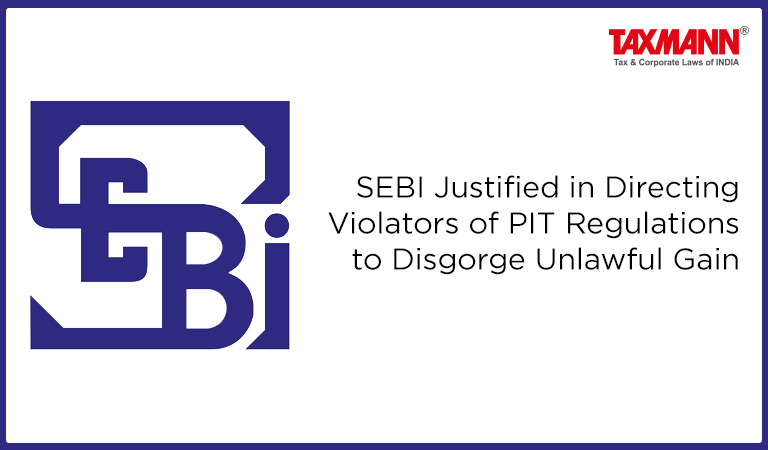SEBI Justified in Directing Violators of PIT Regulations to Disgorge Unlawful Gain
- Blog|News|Company Law|
- 2 Min Read
- By Taxmann
- |
- Last Updated on 16 May, 2023

Case Details: Ms. Pallavi Navinchandra Mehta v. Securities & Exchange Board India - [2023] 149 taxmann.com 429 (SAT-Mumbai)
Judiciary and Counsel Details
-
- Justice Tarun Agarwala, Presiding Officer & Ms Meera Swarup, Technical Member
- Abhishek Venkataraman, Adv., Viswajit P. Deb, Mateena Patca & Ms Ashmita Poojary for the Appellant.
- Mustafa Doctor, Sr. Adv., Manish Chhangani, Ms Samreen Fatima & Sumit Yadav, Advs. for the Respondent.
Facts of the Case
In the instant case, the Board of Directors of the company ‘ADF’ approved the buyback of equity shares of the company u/s 68 of the Companies Act, 2013 for an aggregate amount not exceeding Rs. 18 crores. The said resolution of the board was duly announced on the stock exchange on 27-7-2016, in accordance with the LODR Regulations.
Based on the aforesaid corporate announcement, there was a jump in trading of the scrips of the company. As a result, an investigation was conducted by the SEBI which revealed that the issue regarding the proposed buyback of shares was known only to insiders and was not publicly available.
The said information was Unpublished Price Sensitive Information (UPSI), which materially affected the price of securities and which had a bearing on change in capital structure. It remained out of public knowledge during the period commencing from 21-5-2016 (the day it was first discussed in the company’s board meeting) to 27-7-2016 (when it was disclosed to stock exchange), making the aforesaid period the UPSI period.
Consequently, SEBI imposed a penalty of Rs. 40 lakhs upon the appellants. Thereafter, an appeal was preferred before the Securities Appellate Tribunal (SAT).
SAT Held
The SAT noted that appellant No.3, who was not only a promoter but also an executive director of ‘ADF’, was in possession of UPSI. During the UPSI period, appellant no. 3 communicated the UPSI to his connected entities, including appellant Nos.1 and 2 who then traded in shares of the company based on the UPSI.
The SAT held that the trades executed by the appellants were violative of regulation 4 of the SEBI (Prohibition of Insider Trading) Regulations, 2015.
Further, the SAT held that the order passed by the SEBI directing the appellant to disgorge the amount of unlawful gain, restraining the appellants from accessing the securities market for a period of 6 months and imposing a penalty of Rs. 40 lakhs upon the appellants was justified.
List of Cases Referred to
-
- SEBI v. Abhijit Rajan [2022] 142 taxmann.com 373/174 SCL 555 (SC) (para 8)
- Samir C. Arora v. SEBI [2005] 59 SCL 96 (SAT – Mum.) (para 9)
- ICICI Bank Ltd. v. SEBI [2020] 117 taxmann.com 798 (SAT – Mum.) (para 22).
Disclaimer: The content/information published on the website is only for general information of the user and shall not be construed as legal advice. While the Taxmann has exercised reasonable efforts to ensure the veracity of information/content published, Taxmann shall be under no liability in any manner whatsoever for incorrect information, if any.

Taxmann Publications has a dedicated in-house Research & Editorial Team. This team consists of a team of Chartered Accountants, Company Secretaries, and Lawyers. This team works under the guidance and supervision of editor-in-chief Mr Rakesh Bhargava.
The Research and Editorial Team is responsible for developing reliable and accurate content for the readers. The team follows the six-sigma approach to achieve the benchmark of zero error in its publications and research platforms. The team ensures that the following publication guidelines are thoroughly followed while developing the content:
- The statutory material is obtained only from the authorized and reliable sources
- All the latest developments in the judicial and legislative fields are covered
- Prepare the analytical write-ups on current, controversial, and important issues to help the readers to understand the concept and its implications
- Every content published by Taxmann is complete, accurate and lucid
- All evidence-based statements are supported with proper reference to Section, Circular No., Notification No. or citations
- The golden rules of grammar, style and consistency are thoroughly followed
- Font and size that’s easy to read and remain consistent across all imprint and digital publications are applied



 CA | CS | CMA
CA | CS | CMA
